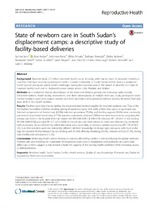| dc.contributor.author | Sami, Samira | |
| dc.contributor.author | Kerber, Kate | |
| dc.contributor.author | Kenyi, Solomon | |
| dc.contributor.author | Amsalu, Ribka | |
| dc.contributor.author | Tomczyk, Barbara | |
| dc.contributor.author | Jackson, Debra | |
| dc.contributor.author | Dimiti, Alexander | |
| dc.contributor.author | Scudder, Elaine | |
| dc.contributor.author | Meyers, Janet | |
| dc.contributor.author | Umurungi, Jean Paul De Charles | |
| dc.contributor.author | Kenneth, Kemish | |
| dc.contributor.author | Mullany, Luke C. | |
| dc.date.accessioned | 2018-10-19T07:30:10Z | |
| dc.date.available | 2018-10-19T07:30:10Z | |
| dc.date.issued | 2017 | |
| dc.identifier.citation | Sami, S. et al. (2017). State of newborn care in South Sudan’s displacement camps: a descriptive study of facility-based deliveries. Reproductive Health, 14: 161 | en_US |
| dc.identifier.issn | 1742-4755 | |
| dc.identifier.uri | http://dx.doi.org/10.1186/s12978-017-0417-z | |
| dc.identifier.uri | http://hdl.handle.net/10566/4142 | |
| dc.description.abstract | BACKGROUND: Approximately 2.7 million neonatal deaths occur annually, with highest rates of neonatal mortality in
countries that have recently experienced conflict. Constant instability in South Sudan further strains a weakened
health system and poses public health challenges during the neonatal period. We aimed to describe the state of
newborn facility-level care in displaced person camps across Juba, Malakal, and Maban.
METHODS: We conducted clinical observations of the labor and delivery period, exit interviews with recently
delivered mothers, health facility assessments, and direct observations of midwife time-use. Study participants were
mother-newborn pairs who sought services and birth attendants who provided delivery services between April and
June 2016 in five health facilities.
RESULTS: Facilities were found to be lacking the recommended medical supplies for essential newborn care. Two of the
five facilities had skilled midwives working during all operating hours, with 6.2% of their time spent on postnatal care.
Selected components of thermal care (62.5%), infection prevention (74.8%), and feeding support (63.6%) were commonly
practiced, but postnatal monitoring (27.7%) was less consistently observed. Differences were found when comparing the
primary care level to the hospital (thermal: relative risk [RR] 0.48 [95% CI] 0.40–0.58; infection: RR 1.28 [1.11–1.47]; feeding:
RR 0.49 [0.40–0.58]; postnatal: RR 3.17 [2.01–5.00]). In the primary care level, relative to newborns delivered by traditional
birth attendants, those delivered by skilled attendants were more likely to receive postnatal monitoring (RR 1.59 [1.09-2.
32]), but other practices were not statistically different. Mothers’ knowledge of danger signs was poor, with fever as the
highest reported (44.8%) followed by not feeding well (41.0%), difficulty breathing (28.9%), reduced activity (27.7%), feeling
cold (18.0%) and convulsions (11.2%).
CONCLUSIONS: Addressing health service delivery in contexts affected by conflict is vital to reducing the global newborn
mortality rate and reaching the Sustainable Development Goals. Gaps in intrapartum and postnatal care, particularly
skilled care at birth, suggest a critical need to build the capacity of the existing health workforce while increasing access
to skilled deliveries. | en_US |
| dc.language.iso | en | en_US |
| dc.publisher | BMC | en_US |
| dc.rights | © The Author(s). 2017 Open Access This article is distributed under the terms of the Creative Commons Attribution 4.0
International License (http://creativecommons.org/licenses/by/4.0/), which permits unrestricted use, distribution, and
reproduction in any medium, provided you give appropriate credit to the original author(s) and the source, provide a link to
the Creative Commons license, and indicate if changes were made. The Creative Commons Public Domain Dedication waiver
(http://creativecommons.org/publicdomain/zero/1.0/) applies to the data made available in this article, unless otherwise stated | |
| dc.subject | Newborn health | en_US |
| dc.subject | South Sudan | en_US |
| dc.subject | Conflict | en_US |
| dc.subject | Health services | en_US |
| dc.subject | Quality of care | en_US |
| dc.subject | Knowledge | en_US |
| dc.subject | Postnatal care | en_US |
| dc.subject | Displaced populations | en_US |
| dc.subject | Newborn commodities | en_US |
| dc.title | State of newborn care in South Sudan’s displacement camps: a descriptive study of facility-based deliveries | en_US |
| dc.type | Article | en_US |
| dc.privacy.showsubmitter | FALSE | |
| dc.status.ispeerreviewed | TRUE | |
| dc.description.accreditation | ISI | |

